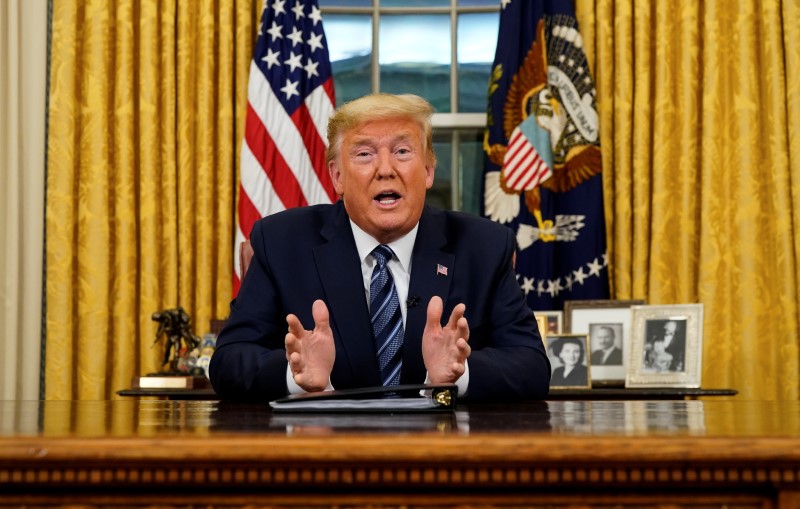By Steve Holland
WASHINGTON (Reuters) - The last time U.S. President Donald Trump addressed the nation from the Oval Office, with a March 11 speech on fighting the coronavirus, the former reality TV star was panned, even by his own aides.
Nearly three months later, a new crisis has arisen and the president and his advisers are debating whether a national address will tamp down a spasm of violent nationwide protests that erupted over the death of George Floyd, an African American, 46, who died in Minneapolis police custody after being pinned beneath a white officer's knee for nearly nine minutes.
An Oval Office speech is one option, a variety of sources inside and outside the White House said, as Trump struggles to contain the violence threatening his political standing before a Nov. 3 election and strike the right tone on race and policing.
Never comfortable with the traditional presidential role of expressing empathy in a national tragedy, Trump has leaned heavily on a law-and-order message in tweets and a call with state governors but avoided making a major speech.
"President Trump is right to be focused on law and order. He wasn't hired to be the consoler-in-chief," said Jason Miller, who advised Trump's 2016 presidential campaign.
Other ideas being discussed include listening sessions or roundtable discussions that would bring Trump together with different voices in the debate, advisers said.
New White House chief of staff Mark Meadows, a former Republican congressman, is pushing for the speech, one source familiar with the internal debate said.
But other advisers in Trump's far-flung network, inside and outside the White House, are wary, saying they doubted a speech would stop the violence. Trump does not always perform well when talking to a camera instead of a live audience, as aides learned from the bumpy March 11 speech.
"Even if he gave the most beautiful and perfect speech, they're going to say, 'Who cares, this is his fault,'" said one adviser, who requested anonymity to speak freely.
KUSHNER CAUTIOUS
One influential senior adviser, Trump's son-in-law Jared Kushner, was not opposed but was cautious about Trump immediately giving a national address, said a source familiar with the discussions.
Kushner spoke to Meadows all weekend and his view was that the president should first talk to the governors and Attorney General William Barr, which he did on Monday, and then evaluate.
Several advisers said they felt Trump's late-night tweet last week suggesting looters be shot was ill-advised.
But they said his Saturday remarks at Kennedy Space Center in Cape Canaveral, Florida, struck the right tone, when he called George Floyd's death "a grave tragedy."
The protests have been felt in a major way at the White House, with marches and violence outside the gates of Trump's residence each night since Friday and nearby businesses damaged.
The Friday protest became so unruly that Secret Service agents moved Trump protectively into an underground bunker beneath the White House for about an hour, said a source familiar with the action.
Shortly after 5 p.m. ET on Monday, at least nine large military vehicles carrying flak-jacketed National Guard troops were seen pulling into the White House driveway on Pennsylvania Avenue.
Trump's frustration with scenes of looting, fires and vandalism across the country appeared to boil over in his call with state governors.
"It's a movement that if you don't put it down, it'll get worse and worse," Trump said, according to audio heard by Reuters.

The protests have complicated Trump's bid to get the U.S. economy on the road to recovery from the effects of the coronavirus, which has killed more than 100,000 Americans and put 40 million people out of work.